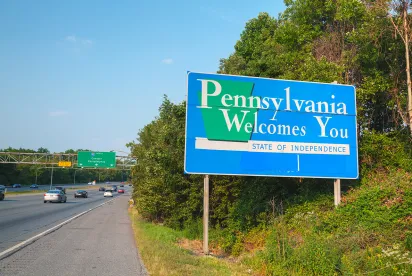UPDATE – June 25, 2020
Reopening PA
All counties in Pennsylvania have moved out of the red phase, with most counties in the green phase of Pennsylvania’s reopening plan. The Governor and Secretary of Health have issued green phase orders concerning counties moving to green, addressing, among other things, occupancy limitations and health and safety mandates with which reopening businesses must comply. Significantly, the green phase eases most restrictions but prohibits large gatherings of more than 250 people and requires individuals to wear masks when entering a business. Under the green phase, the following businesses are permitted to open at up to 50% capacity: (1) restaurants and bars; (2) personal care services, including hair salons and barbershops, by appointment only; (3) indoor recreation, health and wellness facilities – including gyms and spas – with appointments strongly encouraged; and (4) all entertainment businesses, including casinos, theaters, and shopping malls. The latest business guidance, including outdoor recreation guidance, can be found here. Reopening businesses should refer to the COVID-19 dashboard for details with respect to any particular region and must remember to follow CDC and Department of Health guidelines, the Orders of the Governor and the Secretary of Health and any other orders or guidance, including with respect to a particular industry.
UPDATE – May 14, 2020
Reopening PA
Pennsylvania is reopening on a regional basis in three phases: red, yellow, and green. Phases are assigned based on conditions in a county, counties or region. The red phase, which currently applies to most of the state, aims to minimize the spread of COVID-19 through strict social distancing and the closure of nonessential businesses. Under the yellow phase: (1) telework must continue where feasible; (2) businesses with in-person operations must follow business and building safety orders; (3) in-person retail is allowable, but curb-side and delivery is preferable; and (4) restaurants and bars will continue to be limited to carry-out and delivery only. The green phase eases most restrictions, lifting aggressive mitigation orders, but requires businesses and individuals to comply with CDC and PA Department of Health guidelines. The process to reopen is more fully set forth here.
On May 1, 2020, Pennsylvania announced the reopening of 24 counties in the northwest and north-central regions of the state, moving them from red to yellow effective May 8, 2020 at 12:01 a.m. The Governor and Secretary of Health issued yellow phase orders suspending the Stay at Home Order as to these counties only and addressing the limited reopening of businesses in the yellow phase. On May 8, 2020, Pennsylvania announced the reopening of 13 additional counties, moving from red to yellow effective May 15, 2020 at 12:01 a.m. Pennsylvania has also issued guidance setting forth procedures businesses must follow to conduct in-person operations in counties slated to move to the yellow phase.
On May 11, 2020, Governor Wolf reminded Pennsylvanians of the importance of complying with the state’s actions to mitigate the spread of COVID-19 and outlined consequences to businesses and municipalities that fail to remain closed, including waiving eligibility for business liability insurance.
UPDATE – April 20, 2020
On April 15, 2020, Pennsylvania Secretary of Health Rachel Levine, MD, issued a Director’s Order, setting forth certain employee protection measures for businesses that are authorized to maintain in-person operations. The Order takes effect April 19, 2020 at 8 p.m. and requires employers to notify their employees of the new requirements. Among other things, the Order mandates that employers:
-
Provide employees with masks to be worn on the worksite except while eating and drinking during breaks;
-
Provide employees with access to regular handwashing with soap, hand sanitizer, and disinfectant wipes to ensure common areas are cleaned;
-
Stagger work start and stop times for employees where practicable to limit gatherings of people entering or leaving the premises at any given time;
-
Stagger employee break times to limit the number of employees on break at any given time; and
-
Prohibit non-essential visitors from entering the premises.
The Order also details protocols for businesses that have likely been exposed to COVID-19, including temperature screening for employees. The Order prescribes additional measures for public-facing businesses, including, but not limited to, scheduling hourly handwashing breaks, requiring customers to wear masks, and designating specific times to conduct business with elderly and vulnerable persons.
On April 20, 2020, Governor Wolf extended Pennsylvania’s stay-at-home restrictions until May 8, 2020 and issued updated guidance concerning life-sustaining businesses. Further, the Governor amended his March 19, 2020 Order closing non-essential businesses. As set forth in the Amendment: (1) online motor vehicle sales are authorized to commence statewide immediately; (2) the Pennsylvania Liquor Control Board is authorized to commence curbside pickup sales statewide immediately; and (3) limited construction activity is authorized to commence in-person operations statewide beginning on May 8, 2020.
UPDATE – April 5, 2020
On March 23, 2020, Governor Wolf issued a Stay at Home Order to Allegheny, Bucks, Chester, Delaware, Monroe, Montgomery, and Philadelphia Counties. The Order requires all individuals residing in these counties to “stay at home except as needed to access, support, or provide life sustaining business, emergency, or government services.” On April 1, 2020, Governor Wolf expanded the Order to all counties state-wide. In addition, on April 5, 2020, Governor Wolf signed an Executive Order implementing new cleaning protocols for certain buildings with at least 50,000 square feet.
Click here for an updated list of life-sustaining businesses exempt from closure.
UPDATE – March 22, 2020
On March 22, 2020, the City of Philadelphia issued a new Business Activity and Stay at Home Order detailing restrictions on business activity, personal activity, and congregation in Philadelphia in light of the COVID-19 pandemic. The new restriction takes effect March 23, 2020 at 8 a.m. Under the Order, all public gatherings of any number of people are prohibited except in connection with Essential Businesses and Essential Personal Activities. The City Order defers to the list of life-sustaining businesses set forth in Governor Wolf’s Order, but "may impose additional . . . restrictions." Click here for the City Order.
UPDATE - March 20, 2020
On Thursday, March 19, 2020, Pennsylvania Governor Tom Wolf increased Pennsylvania’s COVID-19 response with an unprecedented Executive Order requiring all “non-life sustaining businesses” in Pennsylvania to close their physical locations by 8:00 p.m. Click here to view the Governor’s Order. “Non-life sustaining businesses” are listed here and include businesses in the following industries, among others: construction; manufacturing; retail; and leisure and hospitality. Notably, in extenuating circumstances, exemptions will be granted to businesses supplying or servicing health care providers. Any non-life sustaining businesses failing to comply will be subject to enforcement action as of March 21, 2020 at 12:01 a.m. Keeping with other states and municipalities, “businesses that offer carry-out delivery, and drive through food and beverage may continue to do as long as social distancing and other mitigation measures are employed.” We are monitoring this very fluid situation and will provide updates as they become available.
“You don’t want to be complacent. You always want to be ahead of the curve.” Dr. Anthony Fauci, M.D., Director of National Institute of Allergy and Infectious Diseases.
Pennsylvania has joined other states and major cities strongly urging “non-essential businesses” across Pennsylvania to close for at least 14 days – beginning Tuesday, March 17, 2020 – to help mitigate the spread of COVID-19. See Governor Tom Wolf’s March 16, 2020 Press Release. Under Governor Wolf’s guidance, “non-essential businesses” include public-facing industries such as entertainment, hospitality, and recreation facilities, including but not limited to:
-
Community and recreation centers
-
Gyms, including yoga, barre and spin facilities
-
Hair salons and barber shops, nail salons and spas
-
Casinos
-
Concert venues
-
Theaters
-
Sporting event venues and golf courses
-
Retail facilities, including shopping malls except for pharmacy or other health care facilities within retail operation
In addition, Governor Wolf has ordered all restaurants and bars to cease dine-in operations. Although carry-out, delivery, and drive-through services may continue, eating and drinking inside restaurants and bars is temporarily prohibited. Further, in line with the Trump Administration’s recent guidance, Governor Wolf’s Administration is urging businesses to employ social distancing best practices, including avoiding gatherings of 10 or more people.
According to the Governor’s guidance, “essential” services and sectors include but are not limited to:
-
Food processing
-
Agriculture
-
Industrial manufacturing
-
Feed mills
-
Construction
-
Trash collection
-
Grocery and household goods (including convenience stores)
-
Home repair/hardware and auto repair
-
Pharmacy and other medical facilities
-
Biomedical and healthcare
-
Post offices and shipping outlets
-
Banks
-
Gas stations
-
Laundromats
-
Veterinary clinics and pet stores
-
Warehousing, storage, and distribution
-
Public transportation
-
Hotel and commercial lodging
Pennsylvania is also strongly encouraging other businesses, including legal services, businesses and management consulting, professional services, and insurance services to arrange for employees to work remotely or telecommute to the extent possible. The State hopes to rely on businesses to act now before it is necessary to compel closures under the law, including under section 7301 of the Emergency Management Services Code.
Earlier this week, Governor Wolf designated Bucks County, Chester County, Delaware County, and Montgomery County as mitigation counties, strongly urging non-essential businesses to close. By joint-letter from the Pennsylvania Department of Health (“DOH”) and the Pennsylvania Department of Community & Economic Development (“DCED”) dated March 14, 2020, the DOH urged non-essential businesses to cease operations and the DCED informed businesses that financial assistance opportunities are being made available to mitigate the financial impact of closures.
City of Philadelphia Announces New Restrictions on Business Activity
Philadelphia officials have announced new wide-ranging restrictions on commercial activity and halted all “non-essential” City government operations. The restrictions on commercial activity will remain in effect at least through March 27, 2020. Click here for the City’s Announcement. Under the new restrictions, only “essential businesses” should remain open. The City has designated the following businesses as essential:
-
Supermarkets and grocery stores
-
Big box stores
-
Pharmacies
-
Discount stores, mini-markets, and non-specialized food stores
-
Daycare centers
-
Hardware stores
-
Gas stations
-
Banks
-
Post Offices
-
Laundromats and dry cleaners
-
Veterinary clinics for domestic pets and pet store
Philadelphia has also deemed essential all commercial establishments that sell any of the following:
-
Frozen products
-
Non-specialized stores of computers, telecommunications equipment, audio and video consumer electronics
-
Household appliances
-
IT and telecommunication equipment
-
Hardware, paint, flat glass, electrical, plumbing and heating material
-
Automotive fuel and domestic fuel
-
Sanitary equipment
-
Personal hygiene products
-
Medication not requiring medical prescription
-
Medical and orthopedic equipment
-
Optics and photography equipment
-
Soaps and detergents
Joining with other major cities around the country, Philadelphia is also requiring food establishments to cease dine-in operations for the duration of these restrictions.
Allegheny County Calls Upon Non-Essential Businesses to Close
Allegheny County and Pittsburgh officials also urged “non-essential businesses” to close voluntarily on Sunday, March 15, 2020, including but not limited to:
-
Child care centers
-
Senior centers
-
Community and recreation centers
-
Gyms – including yoga, spin, barre and other similar facilities
-
Hair salons, nail salons and spas
-
Casinos
-
Bars
-
Concert venues
-
Theaters
-
Sporting event facilities
-
Golf clubs
-
Social clubs
-
Non-essential retail facilities including shopping malls (except for pharmacy or other health care facilities located therein)
Significantly, the guidance does not impact supermarkets, pharmacies or gas stations. Consistent with other major cities and municipalities, restaurants in Pittsburgh and Allegheny County are encouraged to stay open for carry-out and delivery only. Churches and other religious institutions have been asked to continue to provide social services and community support but refrain from hosting social gatherings. County and City officials advise that gatherings should be limited to 20 people or less during this time. Click here for the latest COVID-19 developments in Pittsburgh and Allegheny County.





 />i
/>i

